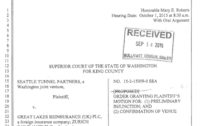A Louisiana contractor is appealing a federal court decision in New Orleans that upheld a decision by the firm’s insurers that effectively denied coverage for millions of dollars in flood damage to a New Orleans hotel renovation project it worked on.
The McDonnel Group, a Metairie, La.-based construction manager and design-builder, is hoping a federal appeals court will overturn a decision earlier this year by U.S. District Court Judge Greg Guidry. He ruled that the deductible on the contractor’s builders’ risk policy is $3.4 million.
The deductible was higher than the actual cost of the flood damage during a New Orleans hotel renovation and became the focus of a lawsuit over wording in the policy.
That exceeds the $3.2 million in water damage to the project, leaving McDonnel with no compensation from its two insurers for damage to the Jung Hotel, which the contractor was renovating at the time, the McDonnel Group contends.
McDonnel says its two insurers, Starr Surplus Lines and Lexington Insurance, a subsidiary of AIG, should have paid out $2.7 million after subtracting $500,000, what the contractor contends is the actual deductible on the policy, not the $3.4 million cited by the insurers.
But the insurers are pointing to the district court decision, which found the formula in the policy the companies used to calculate the $3.4 million deductible was “clear and unambiguous.”
Opened in the 1920s by the Jung family, the hotel promoted itself as the “South’s largest convention hotel located in the heart of America’s Most Interesting City.” The hotel had several different owners but it shut down following Hurricane Katrina in 2006. The renovation allowed the hotel to reopen in 2018.
At the heart of the dispute are two differing ways of calculating the deductible, with each side pointing to language in the policy to back up their arguments.
Builders' risk deductibles are typically based on a percentage. But according to a 2018 report on the website of Independent Agent Magazine, a publication for insurance brokers, the method of calculation varies, particularly in catastrophe-prone regions, and can have a dramatic impact on what the insured ends of paying out of pocket.
Signing onto McDonnel’s suit are the owner of the Jung Hotel in New Orleans, and two of McDonnel’s subcontractors on the project, All Star Electric and Mechanical Construction Co.
“At a minimum, the deductible provision is reasonably susceptible of differing interpretations and, therefore, must be construed in McDonnel’s favor,” lawyers for the contractor wrote in their federal court appeal.
Work began in 2014 on the overall $140-million project. The 17-story structure holds 207 hotel rooms plus meeting spaces.
But McDonnel, its subcontractors and the hotel owner sustained millions of dollars in damages to the project after the project was flooded on Aug. 5, 2017, after a heavy rain.
Insurers Reject Claims
The project’s insurers, Star Surplus Lines and Lexington, which had split coverage of the project on a 50/50 basis, rejected the claims for coverage by the contractor and the hotel owner, leading McDonnel to file its lawsuit six months later in February, 2018.
McDonnel, in its appeal, acknowledges the builders risk policy covered $86 million in work on the project, minus a deductible equal to 5% of that total value.
But the contractor contends the policy, in case of flood damage, called for the 5% deductible to be subtracted not from the $86 million, but rather from a $10 million flood sub limit, resulting in a $500,000 deductible.
That, in turn, should have left both insurers on the hook for $2.7 million in payments to McDonnel, and the hotel owner, Jung LLC, lawyers for the contractor stated in their appeal.
For support, McDonnel cites the opinion submitted by the brokerage for the policy, Arthur J. Gallagher & Co., which offered a similar argument.
However, attorneys for the two insurers contend the deductible damage to the project was always based on 5% of the total insured value.
While the insurance policy does specifically mention a $500,000 deductible in case of flood damage, it is also labeled as the “minimum” required deductible, with $10 million the limit of what the insurers would pay out for flood damage. That is separate from the total insured value of $86 million for the project, which, under the insurers' interpretation, is the basis used to determine the 5% deductible.
Whatever its ruling, the federal appellate court’s decision could set a significant precedent, McDonnel’s attorneys contend.
In particular, the contractor’s legal team cited the “proper interpretation of a deductible provision” in an insurance policy with a “peril-specific sublimit,” combined with the percentage method of determining the deductible based on the risk at the time of the loss.
Only two cases could be found in the records for the federal circuit, each coming to an opposite conclusion.
“This appeal will require the court to address a novel issue of law which no state or federal court in this circuit had considered,” lawyers for the McDonnel Group wrote.





Post a comment to this article
Report Abusive Comment